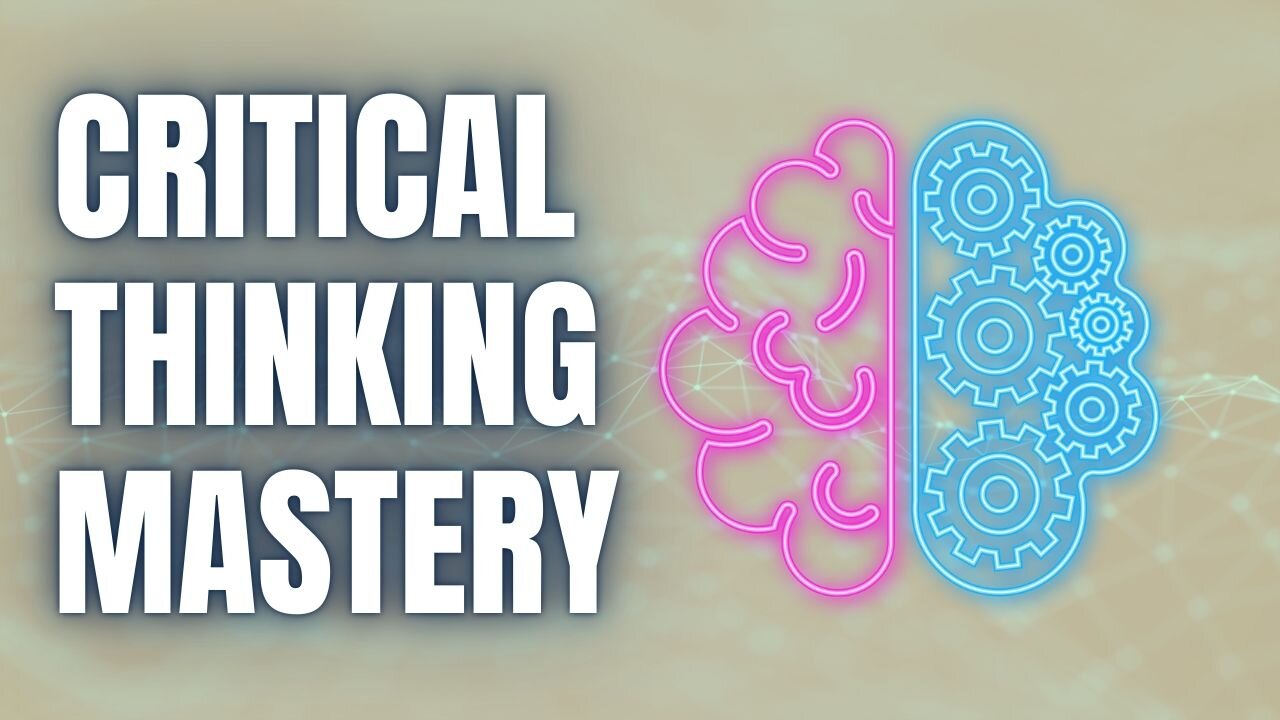Premium Only Content

Critical Thinking Mastery: Transform Your Mindset for Ultimate Personal Growth #CriticalThinking
Critical Thinking Mastery: Transform Your Mindset for Ultimate Personal Growth
Mastering critical thinking is a transformative journey that enhances decision-making, self-awareness, and personal growth. Follow these steps to develop and refine your critical thinking skills:
Step 1: Understand Critical Thinking
Objective: Grasp the fundamentals of critical thinking.
Definition: Critical thinking involves analyzing, evaluating, and synthesizing information to make informed decisions.
Components: It includes reasoning, reflection, and judgment.
Step 2: Assess Your Current Thinking
Objective: Identify your existing thought processes and biases.
Reflect: Evaluate how you make decisions and solve problems.
Identify: Pinpoint any biases or assumptions that may influence your thinking.
Step 3: Question Assumptions
Objective: Challenge and test your own and others' assumptions.
Ask Questions: Regularly ask, "What evidence supports this claim?" and "Are there alternative perspectives?"
Test Assumptions: Explore different viewpoints to validate or question your initial beliefs.
Step 4: Reflect on Your Thought Process
Objective: Improve self-awareness and decision-making.
Analyze: Look back on your thought processes and decisions.
Improve: Identify areas where your reasoning could be strengthened or refined.
Step 5: Seek Diverse Perspectives
Objective: Broaden your understanding and enhance your analytical abilities.
Engage: Interact with people who have different viewpoints and experiences.
Learn: Absorb new information and consider how it contrasts with or complements your own views.
Step 6: Practice Active Listening
Objective: Foster better communication and understanding.
Focus: Listen carefully to others before responding.
Understand: Ensure you fully grasp their viewpoints to engage in more meaningful dialogues.
Step 7: Apply Problem-Solving Frameworks
Objective: Systematically address problems and identify solutions.
Use Frameworks: Employ structured tools like SWOT analysis or the Five Whys to break down complex issues.
Analyze: Apply these frameworks to evaluate problems and devise effective solutions.
Step 8: Engage in Continuous Learning
Objective: Keep your critical thinking skills sharp and relevant.
Stay Curious: Read extensively and explore various subjects.
Educate Yourself: Take courses, participate in discussions, and stay informed about new developments in your areas of interest.
Step 9: Overcome Common Challenges
Objective: Address potential obstacles to effective critical thinking.
Manage Bias: Be aware of cognitive biases and work to mitigate their impact through mindfulness and self-reflection.
Handle Information Overload: Prioritize credible and relevant sources, and develop methods to manage and filter information.
Adapt to Change: Be open to revising long-held beliefs and adapting your mindset as new information emerges.
Step 10: Embrace the Journey
Objective: Integrate critical thinking into your daily life.
Commit: Continuously apply critical thinking techniques in personal and professional contexts.
Reflect: Regularly assess your progress and adjust your strategies as needed.
Conclusion
By following these steps, you can master critical thinking and unlock its transformative potential for personal and professional growth. Embrace each step of the journey, and experience the profound impact that critical thinking can have on your life.
-
 LIVE
LIVE
Right Side Broadcasting Network
1 day agoLIVE REPLAY: President Donald J. Trump Holds His First Rally After Inauguration in Las Vegas - 1/25/25
3,734 watching -
 2:55:24
2:55:24
Jewels Jones Live ®
1 day agoWEEK ONE IN REVIEW | A Political Rendezvous - Ep. 107
146K45 -
 1:33:29
1:33:29
Michael Franzese
1 day agoTrump Wastes No Time: Breaking Down Trump’s First Week Executive Orders | LIVE
152K138 -
 1:26:44
1:26:44
Tactical Advisor
21 hours agoTrump Starting Strong/Shot Show Recap | Vault Room Live Stream 015
107K9 -
 10:18
10:18
MrBigKid
17 hours ago $2.47 earnedInsanely Compact Hunting Tripod you HAVEN'T heard of... Revolve
60.4K5 -
 20:29
20:29
marcushouse
1 day ago $8.70 earnedUnleashing the Power of SpaceX's Starship: Why is it a Big Deal!?
94K29 -
 10:46
10:46
Rethinking the Dollar
1 day agoTrump Knows 'The Real Threat' To Your National Security
68.5K23 -
 17:13
17:13
Degenerate Jay
20 hours ago $1.55 earnedWB Games Is Falling Apart
50K4 -
 9:07
9:07
Bearing
23 hours agoElon Causes a Stir 🤣
38.5K71 -
 8:41
8:41
BIG NEM
1 day agoMeet Tommy: He's a 40 Year Virgin
25.9K2